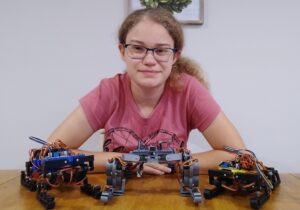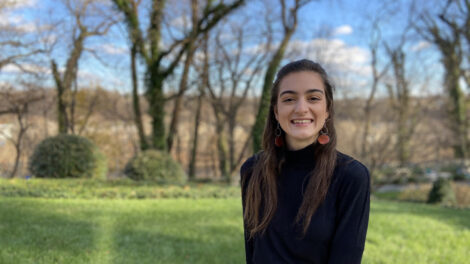By Shannon Sigafoos

Gabrielle Conard ’21 robots she engineered
Mechanical engineering major Gabrielle Conard ’21 didn’t catch the robotics bug until the end of her sophomore year. When she began working with Alex Brown, assistant professor of mechanical engineering, on a low-cost quadruped robot design, she had no idea that less than two years later, the knowledge she’d acquired would go on to fund her academic future.
Currently pursuing her options for graduate school, Conard has received a National Science Foundation (NSF) Graduate Research Fellowship that provides a three-year annual stipend of $34,000, along with cost of education and access to opportunities for professional development. Alums Chenyu Zhang ’19 (cell biology; currently attending University of California, Berkeley) and Daisy Grace ’20 (environmental engineering; currently attending Johns Hopkins University) also were awarded fellowships this year.
Honorable mentions were awarded to alums Andrea Killian Wegrzynowicz ’19 (biochemistry; currently attending University of Wisconsin–Madison), Mary Lissie Connors ’18 (geosciences-petrology; currently attending University of Oregon–Eugene), Scott Berger ’19 (biochemistry; currently attending Stanford University), Leah Shteynman ’20 (geosciences-geochemistry), Vicenzo Joseph Oliett ’20 (social psychology; currently attending Florida State University), and Catherine Marie Newsom-Stewart ’18 (developmental biology; currently attending Washington University).
The NSF Graduate Research Fellowship Program (GRFP) recognizes and supports outstanding graduate students in NSF-supported science, technology, engineering, and mathematics disciplines who are pursuing research-based master’s and doctoral degrees at accredited United States institutions.
“One of my friends encouraged me to apply because I came into the process late, only about a month before the deadline,” recalled Conard. “The process involved several letters of recommendation, as well as a personal statement on how I became interested in STEM, how I was hoping to further the field of STEM, and how that will have a broader impact. The third component involved writing a proposal for a research project.”
Conard, who is currently working on a thesis developing a low-cost quadruped robotics platform that could be used by researchers who may have a limited budget (with Brown as her adviser), plans to utilize her fellowship to further her concentration in the field of robotics.
“I’m particularly interested in space robotics. I’ve always been a fan of astronomy, so either in grad school or beyond graduate school, I would love the opportunity to delve more into that area,” says Conard. “Building robots that could potentially help humans explore other planets would be really fascinating.”


